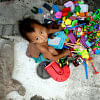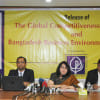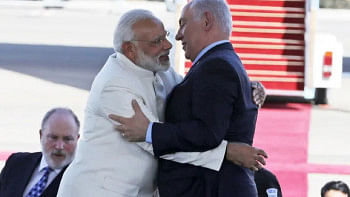Home is not safe for women

World Economic Forum's website had a headline saying "Why home is the least safe place to be a woman" as an introduction to a new report by the United Nations which chronicles widespread domestic violence and abuse perpetrated by husbands, current or former intimate partners or boyfriends, and lovers. Yury Fedotov, executive director at the UN Office on Drugs and Crime (UNODC), writes in the report, "While the vast majority of homicide victims are men, killed by strangers, women are far more likely to die at the hands of someone they know."
Sustainable Development Goal 5 lays out several targets to ensure gender equality by 2030. There are two very important targets relating to violence against women and girls within this goal. Target 5.2 aims to "eliminate all forms of violence against all women and girls in the public and private spheres, including trafficking and sexual and other types of exploitation." Target 5.3, on the other hand, requires elimination of "all harmful practices, such as child, early and forced marriage and female genital mutilation." These two targets take on extra urgency in view of recent reports of increase in the number of incidents of violence against women globally, as well as persistent under-reporting of violence against women and girls (VAWG). Activists around the globe fighting VAGW will draw inspiration from Nadia Murad, a Yazidi human rights activist, and Denis Mukwege, a Congolese gynecologist, who will be in Oslo, Norway on December 10 to receive the Nobel Peace Prize 2018 for their lifelong work in conflict situations to end VAWG.
Two recent reports have put the spotlight on the dangers that married women face in their own homes, and the risks of death that women and girls face outside their homes. The UNODC study mentioned above shows that almost 6 in 10 women intentionally killed are murdered by an intimate partner or a family member. "That equates to 137 killed every day, by people they know. And the number is increasing." The study, released on November 25, 2018 to coincide with the International Day for the Elimination of Violence against Women, points out another worrisome trend. VAWG is one of the "most widespread, persistent and devastating human rights violations in our world today (and) remains largely unreported due to the impunity, silence, stigma and shame surrounding it." UN Secretary-General António Guterres, in his message on this occasion, raised the bar for all countries by alerting them that VAGW is a global pandemic, and warned, "Not until the half of our population represented by women and girls can live free from fear, violence and everyday insecurity, can we truly say we live in a fair and equal world."
Unfortunately, statistics from BBS and various international agencies show that the situation for women and girls in Bangladesh is no better than that of other developing countries. Women here continue to face violence and abuse at the hands of their domestic partners and employers, sexual violence and harassment, and human trafficking and exploitation. Over 60 percent of Bangladeshi women have experienced gender-based violence and nearly two-thirds of victims never seek help.
BBS published the findings of the second round of its survey on violence against women two years ago. It found that 72.6 percent of ever-married women experienced one or more forms of violence (physical, sexual, economic, and emotional abuse; and controlling behaviour) by their husband at least once in their lifetime. VAW Report 2015 also corroborated a well-known fact, i.e. that most women do not report incidents of violence for reasons including family honour, fear of the perpetrator, and shame or embarrassment. Earlier this year, the Home Office of the British Government released a study entitled "Bangladesh: Women fearing gender-based violence" which provides detailed and documented accounts of VAWG. It quotes a study done by Ain o Salish Kendra (ASK) that found that gender-based violence could include, but is not limited to, domestic violence, rape, acid attacks, fatwa-instigated violence, dowry-related violence, sexual harassment and forced marriage.
What can Bangladesh do to make a dent on VAWG? Having committed itself to the SDGs, the country has undertaken several measures to lower the incidence of VAWG. However, there is a lack of consistency, coordination, and uniformity in the measures taken so far. Moreover, we do not yet have a robust and tested SDG-tracking mechanism and this makes progress on this front difficult to measure.
I shed light on some of the challenges Bangladesh faces in implementing the SDG programme, including the data gap, in an earlier column of mine titled "Closing the gap: Challenges to achieving gender equality"(February 27, 2018). Fortunately, anti-VAWG initiative is not a solitary undertaking for the government, and we can work with our local and global partners to finance, innovate, and support the work. The European Union and the United Nations jointly launched the Spotlight Initiative, a new global, multi-year initiative focused on eliminating all forms of VAWG, mostly funded by EU to the tune of EUR 500 million. UN Women (UNW) in its effort to raise consciousness against VAGW has lent its support to the #MeToo movement, a grassroots-based campaign. To mobilise society, activists, governments and the UN system, UNW also formed a partnership with the annual event, "16 Days of Activism", an international campaign to challenge violence against women and girls. This year's 16 days will conclude on the 70th anniversary of the International Human Rights Day, December 10, 2018.
Dr Abdullah Shibli is an economist, and Senior Research Fellow, International Sustainable Development Institute (ISDI), a think-tank in Boston, USA. His new memoir Fairy Tales: Stories from My Life will soon be published by Jonantik.










Comments